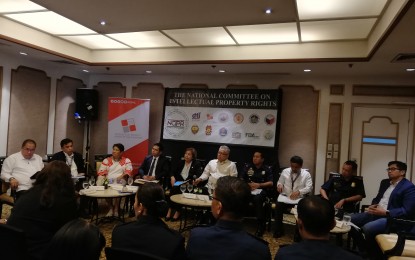
INTELLECTUAL PROPERTY RIGHTS. Representatives of member-agencies to the National Committee on Intellectual Property Rights (NCIPR) conduct a closed-door meeting in Makati City on Wednesday (Sept. 25, 2019). The meeting aims to finalize the 2019-2022 IPR enforcement action plan. (PNA photo by Cristina Arayata)
MANILA -- Members of the National Committee on Intellectual Property Rights (NCIPR) on Wednesday held a closed-door meeting in Makati City as they prepare to finalize the 2019-2022 IPR enforcement action plan.
The committee also tackled other concerns including better coordination among concerned agencies, policing online platforms and payment systems, and ways to prevent counterfeit medicines and pirated materials.
The NCIPR, chaired by the Department of Trade and Industry (DTI), eyes coordination with the Department of Information and Communications Technology (DICT) regarding the issuance of information and communications technology (ICT) policies aligned with the IP laws.
Earlier this year, the Intellectual Property Office of the Philippines (IPOPHL) has filed a bill to amend the IP code. The amendments include the shutting down of online platforms found with IP rights violations, and enabling copyright owners to claim damages from such sites.
IPOPHL Director General Josephine Santiago on Wednesday mentioned the need to strengthen a law that would cover counterfeit products.
She explained that this is also the reason why authorities could not just take actions against those selling counterfeit items at malls, for instance.
"Intellectual property is basically a private right. We need the brand owners to do the actions. Our enforcement agencies like the PNP, they need the complaint from the rights’ owners," she said.
"We don't waste (government) money on things that right owners themselves are not interested," Santiago continued, explaining that some businesses think they're just small and thus they don't mind complaining.
According to NCIPR, a total of PHP13.73 billion worth of fake products were seized from January to July. Most of these are cigarettes, alcohol, pharmaceuticals, and personal care products.
The value is pegged at the value of the original product, said Santiago.
She also commented that the National Bureau of Investigation (NBI), Bureau of Customs (BOC), and the Philippine National Police (PNP) have helped a lot in seizing counterfeit products.
Meanwhile, the NCIPR also eyes strengthening institutional arrangements with the Bureau of Immigration (BI), to deport aliens violating the IPR, as well as with the Bureau of Internal Revenue (BIR) for possible tax evasion cases.
The committee expects the Department of Justice (DOJ) to instruct prosecutors to furnish the Anti-Money Laundering Council of all information filed with the court for possible money laundering investigation.
Moreover, the NCIPR wants local government units and DTI to ensure business permits would not be issued on erring store owners.
Members were also said to have discussed strategies to strengthen the campaign against illegal camcording.
The members of the NCIPR are the DOJ, BOC, NBI, PNP, National Telecommunications Commission, Department of the Interior and Local Government, the National Book Development Board, Optical Media Board, and the Office of Special Envoy on Transnational Crime. (PNA)
